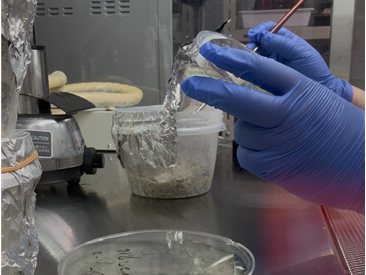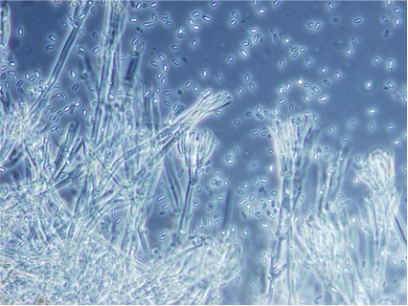[Topics] Professor Masaru Matsumoto and his research team have initiated Japan's first cultivation experiment using Trichoderma grown on used disposable diapers as a growth medium
Tokyu Construction Co., Ltd. and Kyushu University: Transforming Waste into Resources through the Power of Microorganisms
Tokyu Construction Co., Ltd. (Head Office: Shibuya-ku, Tokyo; President: Mitsuhiro Terada), as part of its new business initiative "Earth Zoo," has launched a joint research project with the Institute Tropical Agriculture at Kyushu University (Nishi-ku, Fukuoka; Director: Kimihiko Hyakumura) to conduct Japan's first cultivation experiment utilizing used disposable diapers as a novel greening material. This experiment aims to develop a cultivation technique for Trichoderma, a soil microorganism known for its ability to decompose diapers and promote plant growth.
"Earth Zoo" is a new business initiative that aims to produce base fertilizers for potting soil and greening substrates by utilizing sludge generated during the hydrolysis treatment of used disposable diapers as organic fertilizer. Since fiscal year 2024, Tokyu Construction has been conducting research in collaboration with two other companies to commercialize this technology.
Building upon insights gained through the "Earth Zoo" research initiative, Tokyu Construction has been exploring further effective applications for used disposable diapers.
While exploring advanced methods for processing used disposable diapers, Tokyu Construction received a proposal from the Institute of Tropical Agriculture at Kyushu University--an institution with recognized expertise and achievements in tropical agriculture--to utilize Trichoderma, a type of filamentous fungus widely used in agricultural settings for its plant growth-promoting properties. In response, Tokyu Construction and Kyushu University have initiated Japan's first joint experiment to cultivate Trichoderma using used disposable diapers as a growth substrate, aiming to develop a novel greening material.
Filamentous fungi are microorganisms that form hyphae and reproduce via spores. They are commonly referred to as "molds" in everyday language.


Expected Outcomes of the Experiment
In this experiment, Trichoderma are inoculated onto used disposable diapers to evaluate their effectiveness. The primary expected outcomes are as follows:
1. Enhanced decomposition of organic components contained in disposable diapers
2. Promotion of root tissue development in plants
3. Suppression of soil-borne pathogenic fungi, leading to reduced incidence of soil-borne diseases
These effects suggest the potential for repurposing used disposable diapers as valuable greening materials. Furthermore, by employing filamentous fungi in a nature-based treatment process, this approach not only contributes to reducing CO₂ emissions but also enables the production of circular materials that improve plant growth environments and promote greening initiatives.
About Trichoderma
Trichoderma are a type of fungus widely distributed in natural soils, particularly abundant in the rhizosphere--the region surrounding plant roots. These fungi play a crucial role in suppressing the invasion and proliferation of pathogenic microorganisms harmful to plants, effectively acting as a natural barrier.
Trichoderma also support the development of plant root tissues, thereby enhancing nutrient absorption and improving overall crop growth. In agricultural settings, they are utilized for the control of soil-borne diseases and for increasing crop yields. Due to their high safety and low environmental impact, Trichoderma are gaining attention as sustainable "microbial agents."
Trichoderma exhibit low toxicity to humans and animals, and are increasingly recognized as key microorganisms supporting sustainable agriculture and greening practices. Research and practical applications are actively being pursued both domestically and internationally.
Future Directions
Tokyu Construction aims to apply the insights gained from this experiment to develop greening technologies that can generate synergies with its core construction business. Through applications such as rooftop greening of commercial facilities and vegetation of riverbanks and railway embankments, the company seeks to contribute to environmentally conscious urban development.
"Earth Zoo" is a registered trademark of Tokyu Construction Co., Ltd. (Trademark Registration No. 6753112).
Reference Release
About Tokyu Construction Co., Ltd.
Tokyu Construction is a comprehensive construction company engaged in building construction and infrastructure development both in Japan and overseas. Guided by its corporate philosophy--"Realizing individual dreams through the creation of safe and comfortable living environments"--the company leverages its expertise and know-how in urban development cultivated through projects in Shibuya and along the Tokyu railway lines.
Under its long-term management plan aimed at achieving the corporate vision "VISION 2030," Tokyu Construction has identified three core value propositions: decarbonization, zero waste, and disaster prevention and mitigation. By positioning human resources and digital technology as sources of competitive advantage, the company is committed to addressing social challenges and enhancing sustainable corporate value.
Address:
Shibuya Chikatetsu Building, 1-16-14 Shibuya, Shibuya-ku, Tokyo 150-8340, Japan
URL:https://www.tokyu-cnst.co.jp
About Institute of Tropical Agriculture, Kyushu University
The Institute of Tropical Agriculture at Kyushu University aims to address critical issues in tropical and subtropical regions, including biodiversity loss, depletion of forest resources, water scarcity caused by global warming and changes in rainfall patterns, and food shortages due to population growth.
To achieve these goals, the institute conducts international collaborative research with scholars from tropical and subtropical countries as well as researchers from other universities in Japan. The outcomes of these interdisciplinary studies are disseminated to society to promote practical applications.
Furthermore, the institute engages in international cooperation by working closely with agricultural and forestry administrative agencies, local NGOs, community members, and researchers in tropical and subtropical regions.
Address: 744 Motooka, Nishi-ku, Fukuoka 819-0395, Japan
URL:https://www.agr.kyushu-u.ac.jp/tropic/
For Research-related inquiries
Masaru Matsumoto, Professor
TEL: 092-802-4834
Mail:mmatsu★agr.kyushu-u.ac.jp
Please replace ★ with @ in the email address












 Contact
Contact
 Access Map
Access Map

